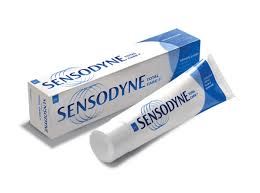Toothpaste a guide..
A quick guide to toothpaste…
Sensitive teeth?
If you have sensitivity, it can be down to a number of things, gum recession or where your enamel has worn. Some people can manage their sensitivity without the need for specialist toothpaste but some patients can get sensitivity so badly that it can be mistaken for toothache.
Our dentists recommend Sensodyne Complete Protection which has been specially designed for people with sensitive teeth. Sensodyne Complete Protection contains NovaMin (which is inorganic chemical calcium sodium phosphosilicate) this creates a tooth-like mineral layer over the dentine surface. Which helps to stop sensitivity.
If sensitive toothpaste is used twice daily everyday, it is much more beneficial than sporadic use.
Fluoride or not to fluoride?
Fluoride is something we love as a dental practice it has been researched for over 60 years, and water fluoridation has been proven to reduce decay by 40 to 60 percent. Therefore we always recommend our patients use a toothpaste with fluoride. Now you might be wondering what is fluoride? Fluoride is actually a natural mineral that is found in many foods and in all drinking water.
Fluoride has been proven to help the tooth enamel, making it more resistant to tooth decay.
Sooo many reports have been published throughout the world about fluoride. Some good & some bad but the scientific conclusion is that fluoride toothpaste and correctly fluoridated water are a wonderful benefit to good oral health & it helps to reduce decay. Studies have not found any evidence that fluoride added to water causes harmful side effects.
People who are against fluoridation claim they have firm evidence that fluoride added to water is harmful. However, scientific analysis has not supported their claims.
Do Whitening toothpastes work?
Everyone wants a whiter smile but not everyone can afford whitening treatments performed by a dentist so as an effect from that whitening toothpaste has sky rocketed. Sales in 2009, UK sales of whitening toothpastes had increased by 15 per cent, rising from £55 million in 2006 to £63 million in 2008!!
So toothpastes do they work, well with teeth there are different types of discolouration therefore they have to be approached in different ways. Whitening toothpastes work on the enamel, while whitening treatments clean the dentine using (in our practice) Carbamide peroxide which can penetrate into it.
Now staining comes from foods such as red wine, coffee, tea, curry & smoking so the whitening toothpastes usually use abrasion techniques, this kind of toothpaste will usually have a gritty consistency which literally scrubs the stain off the tooth. But… (there is a but!!) it can wear the enamel away & then in turn cause sensitivity.
So generally we say whitening toothpastes do not work, they will however remove cosmetic surface staining! So if you really want to whiten your teeth then contact your dentist to see what kind of whitening treatments they offer..
Can’t stand that minty taste?
Lot’s of people really struggle with the minty tastes of most toothpaste, patients sometimes even refrain from brushing their teeth to avoid having to taste it. Oranurse toothpaste has been specially formulated for people sensitive to strong flavours.
- It has 1450ppm fluoride and is SLS free (which means it is non-foaming)
- This has resulted in a paste with no flavour or sodium lauryl sulphate
- 1450ppm fluoride
This unflavoured toothpaste was initially developed to help autistic children who have a problem with taste, even to the extent of not liking the taste of water. This has resulted in a paste with no flavour. So if you or your child dislikes the taste of mint & brushing has become a battle then maybe this could be contender?
We hope this has been helpful, if you would like to discuss toothpaste with your dentist please enquire at your next check up…
Return to Blog



